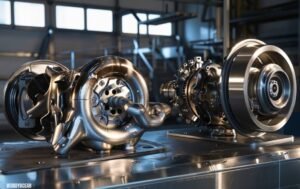The Power of Fiber Glass 121 Textron: Versatile & Strong

Imagine a material so versatile it can insulate our homes, reinforce our structures, and even filter our water. This material is Fiber Glass 121 Textron, a remarkable substance that has revolutionized countless industries. Among the myriad of fiber glass types, It stands out for its exceptional properties and wide-ranging applications. In this comprehensive exploration, we will delve into the world of fiber glass, uncovering its unique qualities, diverse applications, and the benefits it offers across various sectors.
Understanding Fiber Glass 121 Textron
It is a specialized type of fiber glass known for its exceptional strength, durability, and thermal resistance. It is composed of tiny glass fibers that are woven together to form a strong, flexible material. The manufacturing process involves heating a mixture of silica sand, limestone, borax, and other raw materials to a molten state, then drawing the molten material into thin fibers.
One of the key characteristics that distinguishes Fiber Glass 121 Textron from other fiber glass types is its high tensile strength. This means it can withstand significant pulling forces without breaking, making it ideal for applications that require durability and structural integrity. Additionally, it exhibits excellent thermal insulation properties, providing resistance to heat transfer and making it a valuable material for insulation applications.
The combination of strength, durability, and thermal resistance makes Fiber Glass 121 Textron a versatile material with numerous advantages. It is lightweight, corrosion-resistant, and dimensionally stable, making it suitable for a wide range of industries and applications.
Applications of Fiber Glass 121 Textron
Fiber Glass 121 Textron’s exceptional properties make it a valuable material in a wide range of industries. Its strength, durability, and thermal resistance are key factors that contribute to its versatility.
Industrial Applications
In industrial settings, it finds numerous applications. One of its most common uses is in insulation, where its excellent thermal properties help to maintain temperature control in various industrial processes. It is also widely used as a reinforcement material in composite structures, providing strength and durability to components such as pipes, tanks, and machinery. Additionally,its filtration capabilities make it an ideal choice for filtering liquids and gases in industrial processes.
Construction Industry
The construction industry is another major consumer of it In roofing applications, it is used as a reinforcement material in shingles and other roofing products, enhancing their durability and resistance to weather damage. As an insulation material,it helps to improve energy efficiency in buildings by reducing heat loss and gain. It is also used in structural components such as fiberglass rods and panels, providing strength and lightweight properties.
Other Applications
Beyond industrial and construction applications,it has found its way into various niche markets. In the automotive industry, it is used in components such as body panels, insulation, and brake linings. The marine industry utilizes Fiber Glass 121 Textron for boat hulls, decks, and other structural elements. Even the aerospace industry benefits from its properties, using it in components such as radomes and insulation panels.
The versatility of it extends to emerging applications as well. As technology advances, new and innovative uses for this material continue to emerge, demonstrating its potential to meet the evolving needs of various industries.
Comparing Fiber Glass 121 Textron to Other Types
When selecting the ideal fiber glass type for a particular application, it is essential to consider the unique properties and characteristics of each option. Fiber Glass 121 Textron, while offering exceptional benefits, is not the only choice available. It is important to compare it to other popular fiber glass types to make an informed decision.
One common comparison is between it and E-glass. E-glass is a widely used fiber glass type known for its electrical resistance and good mechanical properties. While both it and E-glass are suitable for many applications, it often excels in terms of strength, durability, and thermal resistance.
Another comparison can be drawn between it and S-glass. S-glass is a high-strength fiber glass type that is often used in aerospace and marine applications. While S-glass offers exceptional strength, it may be more expensive than Fiber Glass 121 Textron.
When evaluating the advantages and disadvantages of it it is important to consider factors such as cost, performance requirements, and specific application needs. It strength, durability, and thermal resistance make it an excellent choice for many applications, but it may not be the most cost-effective option in every case.
To select the appropriate fiber glass type for a given project, it is essential to carefully assess the specific requirements. Factors such as the desired mechanical properties, thermal performance, and environmental conditions should be taken into account. By considering these factors and comparing the available options, you can make an informed decision and choose the fiber glass type that best suits your needs.
Safety Considerations and Best Practices
While it offers numerous benefits, it is essential to handle, store, and transport it safely to protect both yourself and the environment. Proper safety measures are crucial to prevent accidents and minimize potential health risks.
When handling Fiber Glass 121 Textron, it is important to wear appropriate personal protective equipment (PPE). This includes gloves to protect your hands from cuts and abrasions, a respirator to prevent inhalation of fiber glass particles, and safety glasses or goggles to protect your eyes. Additionally, it is advisable to wear long sleeves and long pants to minimize skin contact.
Proper storage and transportation of it are equally important. Store it in a dry, well-ventilated area, away from heat sources and direct sunlight. When transporting it ensure it is securely packaged and labeled to prevent damage and exposure.
While fiber glass is generally considered safe when handled properly, it is important to be aware of its potential environmental impact. Fiber glass particles can become airborne and contaminate the air, potentially affecting respiratory health. To minimize environmental impact, it is essential to follow proper handling and disposal practices. Avoid creating dust during cutting, sanding, or other activities. Dispose of fiber glass waste responsibly, following local regulations and guidelines.
By adhering to these safety precautions and best practices, you can minimize risks and ensure the safe and responsible use of Fiber Glass.
Case Studies and Success Stories
To truly appreciate the versatility and effectiveness of Fiber Glass 121 Textron, it is helpful to explore real-world examples of its successful applications. Numerous projects across various industries have demonstrated the value and benefits of this remarkable material.
One such example is the construction of a state-of-the-art manufacturing facility. Fiber Glass 121 Textron was chosen for its structural components due to its exceptional strength and durability. The facility’s engineers were impressed by the material’s ability to withstand heavy loads and harsh environmental conditions, ensuring the long-term stability and performance of the building.
Another success story involves a marine application. A boat builder selected Fiber Glass 121 Textron to construct the hull of a high-performance yacht. The material’s lightweight properties and resistance to corrosion were crucial factors in the decision-making process. The resulting yacht exceeded expectations in terms of speed, maneuverability, and durability.
Testimonials from satisfied customers and industry experts further highlight the benefits of Fiber Glass. One customer shared their experience, stating that the material’s thermal insulation properties significantly reduced energy costs in their industrial facility. Another industry expert praised Fiber Glass 121 Textron’s versatility, noting its suitability for a wide range of applications, from construction to aerospace.
The measurable results achieved through the use of Fiber Glass 121 Textron are equally impressive. In many cases, the material has led to significant cost savings, improved performance, and enhanced durability. For example, a company that used Fiber Glass 121 Textron for its filtration systems reported a reduction in maintenance costs and improved product quality.
These case studies and testimonials demonstrate the real-world value of Fiber Glass 121 Textron. Its exceptional properties, versatility, and proven track record make it a valuable choice for a wide range of industries and applications.
Conclusion
Throughout this exploration of Fiber Glass 121 Textron, we have uncovered its remarkable properties, diverse applications, and the numerous benefits it offers. From its exceptional strength and durability to its excellent thermal resistance, Fiber Glass 121 Textron has proven itself to be a valuable material in a wide range of industries.
Whether you are involved in construction, manufacturing, or any other field that requires a versatile and high-performance material, Fiber Glass is worth considering. Its ability to enhance efficiency, durability, and sustainability makes it a valuable asset for businesses and individuals alike.
As technology continues to advance, we can expect to see even more innovative applications of Fiber Glass 121 Textron. Its potential to contribute to a more sustainable and efficient future is undeniable.
We encourage you to delve deeper into the world of Fiber Glass 121 Textron and explore its potential applications in your specific field. By understanding its unique qualities and benefits, you can make informed decisions and harness the power of this remarkable material.
The future of fiber glass looks bright, and Fiber Glass 121 Textron is poised to play a significant role in shaping that future.
FAQs
Q: What is Fiber Glass 121 Textron?
A: Fiber Glass 121 Textron is a specialized type of fiber glass known for its exceptional strength, durability, and thermal resistance. It is composed of tiny glass fibers that are woven together to form a strong, flexible material.
Q: What are the key properties of Fiber Glass 121 Textron?
A: Fiber Glass 121 Textron is characterized by its high tensile strength, excellent thermal insulation properties, lightweight nature, corrosion resistance, and dimensional stability.
Q: What are the common applications of Fiber Glass 121 Textron?
A: Fiber Glass 121 Textron finds applications in various industries, including construction, industrial processes, automotive, marine, and aerospace. It is used in insulation, reinforcement materials, filtration systems, roofing, structural components, and more.
Q: How does Fiber Glass 121 Textron compare to other fiber glass types?
A: Fiber Glass 121 Textron often excels in terms of strength, durability, and thermal resistance compared to other fiber glass types like E-glass and S-glass. However, the choice between different types depends on specific project requirements and factors such as cost and performance.







